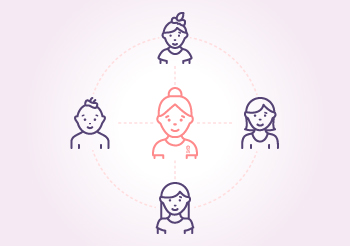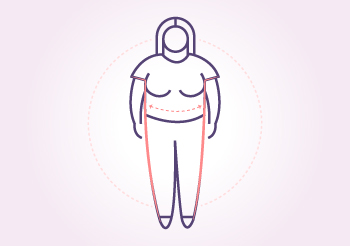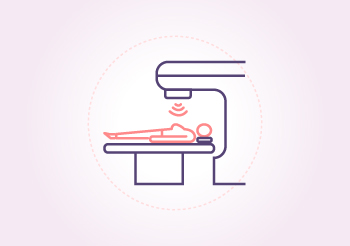Causes of Breast Cancer
- The causes of breast cancer are not fully understood, making it difficult to say why one woman may develop breast cancer and another may not.
- 90% breast cancer cases are sporadic (i.e. with no specific cause) and less than 10% are genetic in nature
- There are risk factors known to affect your likelihood of developing breast cancer.
- Some of these you cannot do anything about, but there are some you can change.

Age
The risk of developing breast cancer increases with age. In western world, breast cancer is most common in women over age 50, but in India, the peak incidence seems to be around 40-45 years
Family history
Having one or more relatives with history of breast or ovarian cancer increases the risk of development of breast cancer. But mere presence of cancer in relatives doesn't mean genetic cancer syndromes. The BRCA1 and BRCA2 genes can increase the risk of developing both breast and ovarian cancer and these genes can be passed on to the child from a parent.
Other genes TP53 and CHEK2, are also associated with an increased risk of breast cancer.


Previous breast cancer or lump
If you have previously had breast cancer or early non-invasive cancer cell changes in breast ducts, you have a higher risk of developing it again, either in your other breast or in the same breast.
Some benign changes in your breast tissue, such as cells growing abnormally in ducts (atypical ductal hyperplasia), or abnormal cells inside your breast lobes (lobular carcinoma in situ), can make getting breast cancer more likely.
Dense breast tissue
Women with dense breast tissue may have a higher risk of developing breast cancer as there are more cells that can become cancerous. Dense breast tissue also makes a mammogram difficult to read and unreliable.Also the younger the age, the denser is the breast tissue.


Hormones and hormone medicine
1. Exposure to oestrogen
The female hormone oestrogen can stimulate breast cancer cells, hence the risk of developing breast cancer may rise with exposure to estrogen. Therefore, an early age of starting periods and a late menopause can increase risk. Similarly, not having children or having children at a later age increases the risk.
2. Hormone replacement therapy (HRT)
All types of HRT can increase the risk of breast cancer, except for vaginal oestrogen but there seems to be no increased risk of breast cancer if you take HRT for less than 1 year.
Contraceptive pill: Research shows that women who take the contraceptive pill have a slightly increased risk of developing breast cancer. However, the risk starts to decrease once you stop taking the pill, and your risk of breast cancer is back to normal 10 years after stopping.
Being overweight or obese
Being overweight or obese, especially after menopause, increases the risk of breast cancer. This is due to increased production of estrogen in the body.


Alcohol
Alcohol increases the risk of breast cancer and this is associated even with small amounts of alcohol on a regular basis.
Radiation
Past history of receiving Radiation may increase slightly their risk of breast cancer.

